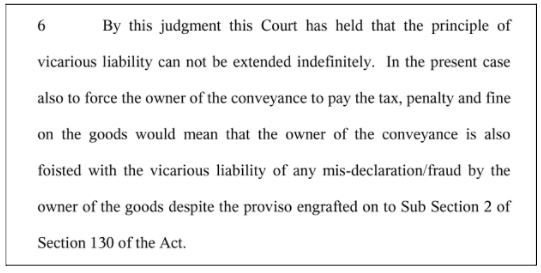In this roundup of the Court Judgements, we look at the Supreme Court’s observations & directions that Posting of spouses, the needs of the disabled and compassionate grounds should be given due consideration when considering Inter-Commissionerate Transfers, that jurisdiction of a Court under the Contempt of Courts Act does not cease just because the order of which contempt is alleged, is executable, and that Once common intention to kill is established, the cause of injury or weapons used is irrelevant.
SC: Posting of spouses, the needs of the disabled and compassionate grounds should be given due consideration when considering ICT
In SK Naushad Rahman and others vs. Union of India, the Supreme Court heard appeals against the Kerala High Court’s judgment rejecting the challenge against the validity of a circular issued by the Central Board of Indirect Taxes and Customs (CBIC) in 2018 withdrawing Inter-Commissionerate Transfers (ICT). The Supreme Court Bench consisting of Justice DY Chandrachud, and Justice Vikram Nath upheld the Kerala High Court’s judgment which approved the withdrawal of ICTs.
The basic guidelines in service jurisprudence are-
- The exigencies of service govern the transfer of employees. Employees do not have the right to claim a posting of their choice.
- Individual convenience of persons who are employed in the service is subject to the overarching needs of the administration.
- Policies that call for the posting of spouses at the same station depend on the requirement of the administration.
- Law enacted by the competent legislature, rules made under Article 309, instructions issued under Articles 73 and 162 govern the issuance of norms applicable to the recruitment and conditions of service of officers belonging to the civil services
- If there is a conflict between Rules under Article 309 and executive instructions, Rules would prevail.
- The recruitment rules framed under legislative enactment or as per rules under Article 309 prevail over the decisions taken under the power conferred by Article 73 of the Constitution on Union and under Article 162 on State.
Keeping in mind the above precepts, the Bench recommended formulation of a policy by the State for its employees such that the importance of protecting family life as an element of the dignity of the person and a postulate of privacy is given due consideration while upholding basic constitutional values such as Article 21 (protection of life and personal liberty). The Bench called for considering the posting of spouses, the needs of the disabled and compassionate grounds, responding to the challenge against the circular based on gender equality and the need for equal treatment of disabled persons.
Citing previous judgements, the Bench emphasized the need to ensure substantive equality of opportunity through policy. Further, it noted that Article 15(3) of the Constitution calls for adopting special provisions for women and children, and spousal posting should also be considered in this manner. With respect to persons with disabilities, the policy must ensure their right to live with dignity. It also stated that the interference of the State in the rights of privacy, dignity, and family life of persons must be proportional.
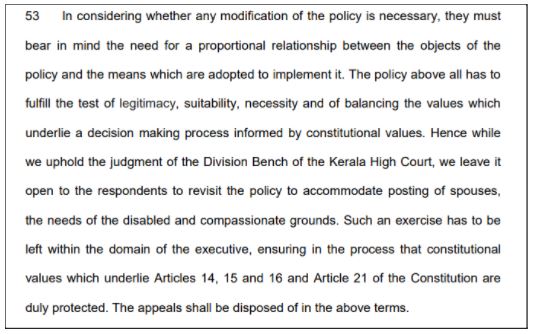
SC: Jurisdiction of a Court under the Contempt of Courts Act does not cease just because the order of which contempt is alleged, is executable
In contempt petition, Urban Infrastructure Real Estate Fund vs. Dharmesh S. Jain, the Supreme Court had earlier directed the respondents to deposit the amount as per the order passed by the High Court in September 2019 within a period of 8 weeks. Further, the Court added that non-compliance of the same would be treated very seriously. If the said amount was not deposited as per High Court’s order, it would be considered as non-compliance with the order of the Apex Court and will have serious consequences.
However, in the present case, the respondents asserted that non-compliance with the condition of deposit would only end up in the enforcement of the Arbitrator’s final decision and so, contempt proceedings should not be initiated for non-compliance with such condition that was not mandatory in nature.
The Court observed that there are two options for a party when they haven’t complied with an order/direction in a stipulated time period-
- Give an explanation to the Court as to why the party could not comply with the order of the Court
- Or request for more time to comply with the order of the Court
The bench comprising Justices MR Shah and BV Nagarathna held the party responsible for the delay of compliance guilty of contempt, noting that the respondents had not resorted to either of the options. The bench also observed that the jurisdiction of a Court under the Contempt of Courts Act would not end just because the order or decree of which contempt is alleged, is executable. Moreover, irrespective of the executability of the order, the question to be considered is if the conduct of the party involved in contempt would make a fit case for awarding punishment for contempt of Court.
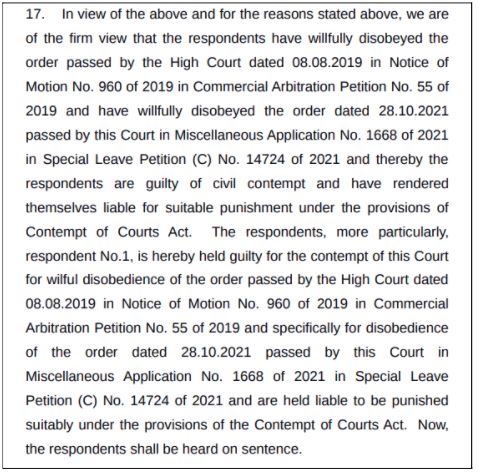
SC: Once common intention to kill is established, the cause of injury or weapons used is irrelevant
In January 2002, Devendra went to the house of the accused Ramjilal for demanding money for the grinding of wheat flour in the flour mill. Two other accused persons assaulted him. The accused persons also went to his brother’s house, assaulted him, and shot him with firearms. The incident had a couple of witnesses. Devendra’s brother succumbed to the injuries on the way to the police station. When the case was taken to the Trial Court, it held that all the accused shared the common intention to kill the deceased and sentenced all of them to life imprisonment along with a fine of Rs. 5,000 per person.
Three of the accused then appealed to the High Court which acquitted them on grounds that there were contradictions in ocular and medical evidence and gave them the benefit of doubt. In the State of MP vs. Ramji Lal Sharma, the Supreme Court considered the appeal filed by the State against this judgement of the High Court.
The Supreme Court Bench consisting of Justices MR Shah and BV Nagarathna referred to the evidence on record and observed that there were no material contradictions in the ocular and the medical evidence, contrary to the High Court’s observation. The Apex Court noted that the presence of all the accused was established and proved and that the prosecution had also proved that all the accused shared the common intention to kill the deceased. According to the Supreme Court, the common intention to kill is what mattered, and the use of weapons or cause of injury was irrelevant. It quashed the High Court’s judgment and restored that of the Trial Court.
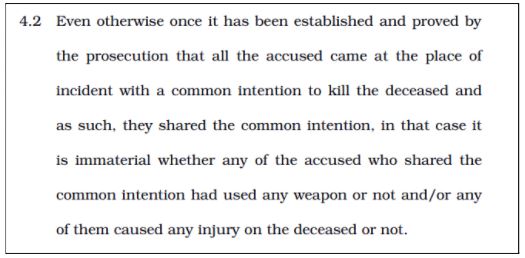
SC: Academic matters are best left to the academics and courts have no expertise in it
In Mahesh Kumar vs. Staff Selection Commission, the Supreme Court considered an SLP assailing Delhi High Court’s order from 05 March 2021. The petitioner had approached the High Court regarding the evaluation of his answer scripts, stating that certain marks were deducted which were not supposed to deduct. The Supreme Court Bench comprising of Justices MR Shah and BV Nagarathna dismissed the petition and upheld the High Court’s decision to not entertain the writ petition stating that conscious decision was taken by experts and the courts did not have any expertise in the matter. Adding that academic matters are best left to the academics, it stated that it did not find any reason to interfere in the matter.
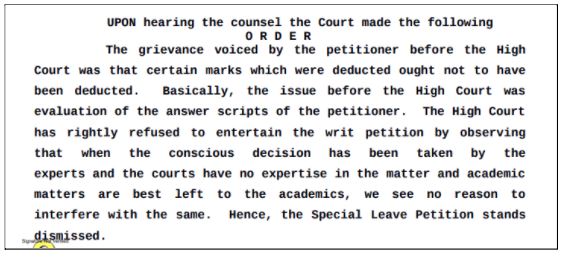
Punjab & Haryana HC: Principle of vicarious liability cannot be extended indefinitely
Proceedings were initiated under Section 130 for the non-payment of fine and penalty in 14 days since the tax authorities confiscated goods and conveyance during transit as the tax was not paid for the goods. While the owner of the goods did not pay the fine or penalty, the owner of the vehicle paid the fine for conveyance. Despite this, the authorities did not release the conveyance citing that the fine on the goods is also paid. The vehicle owner filed a writ petition, Vijay Mamgain vs. State of Haryana raising the issue as to whether conveyance detained by the tax authorities can be released on payment of the fine imposed on conveyance while the fine imposed on goods is not paid.
It was argued by the State that there was no warrant for the proposition that owner of goods and owner of vehicles were two separate entities since the CGST Act made it clear that whoever wants the vehicle or goods to be released, must pay all the tax, fine, and penalty involved.
The Punjab and Haryana High Court division bench of Justice Ajay Tewari and Pankaj Jain rejected the argument and held that the owner of the vehicle and the owner of the goods were different. Hence, the owner of the vehicle cannot be considered vicariously liable for the fine and penalty levied on the goods and cannot be forced to pay the fine or penalty imposed on the goods. Moreover, the conveyance could also not be detained since the fine and penalty levied on it were paid.
